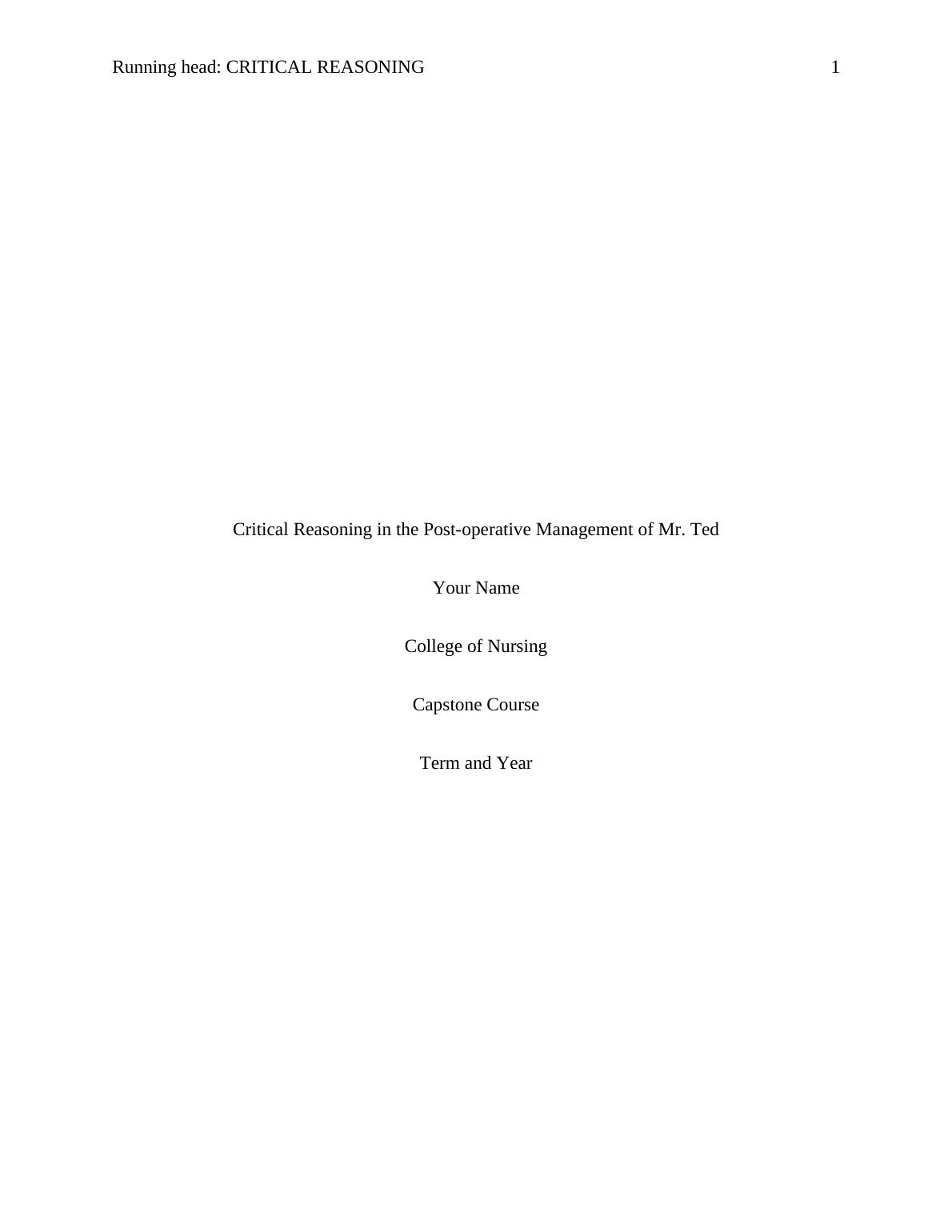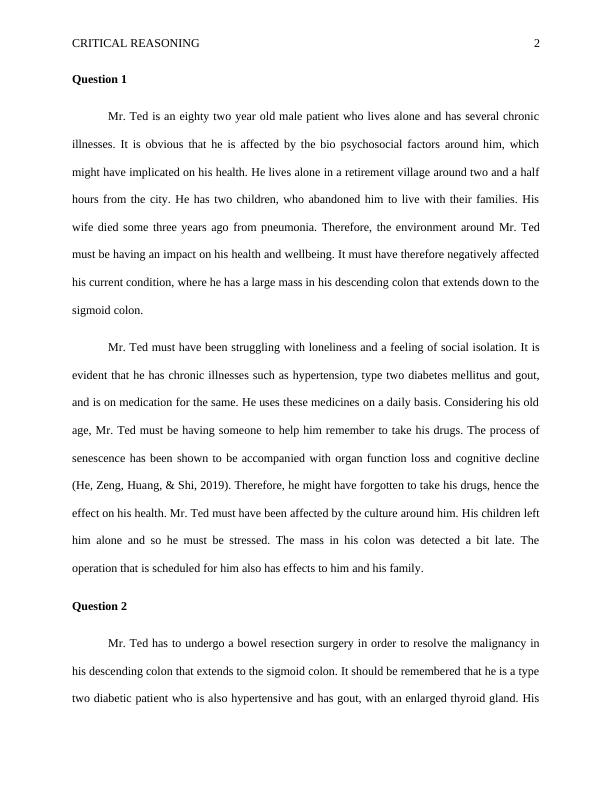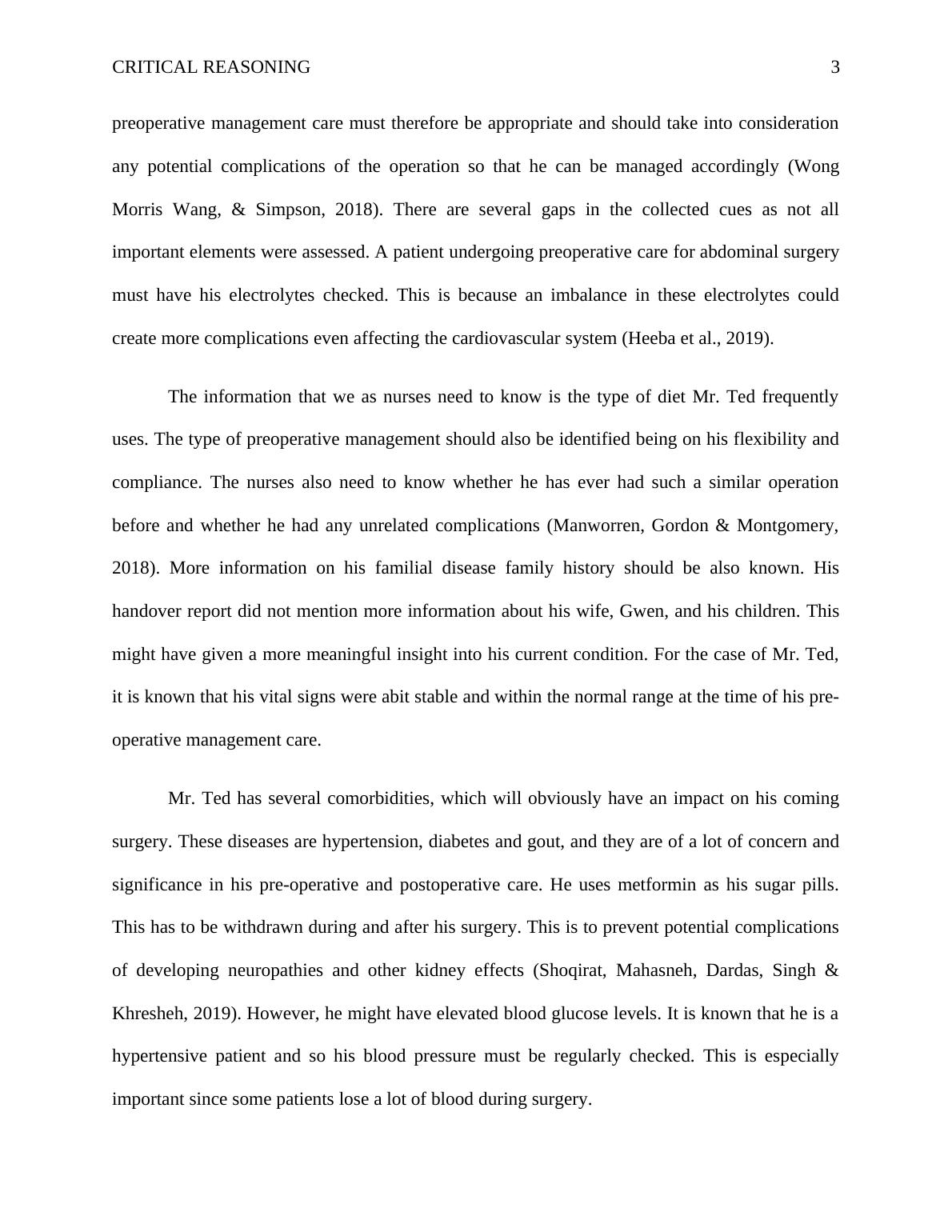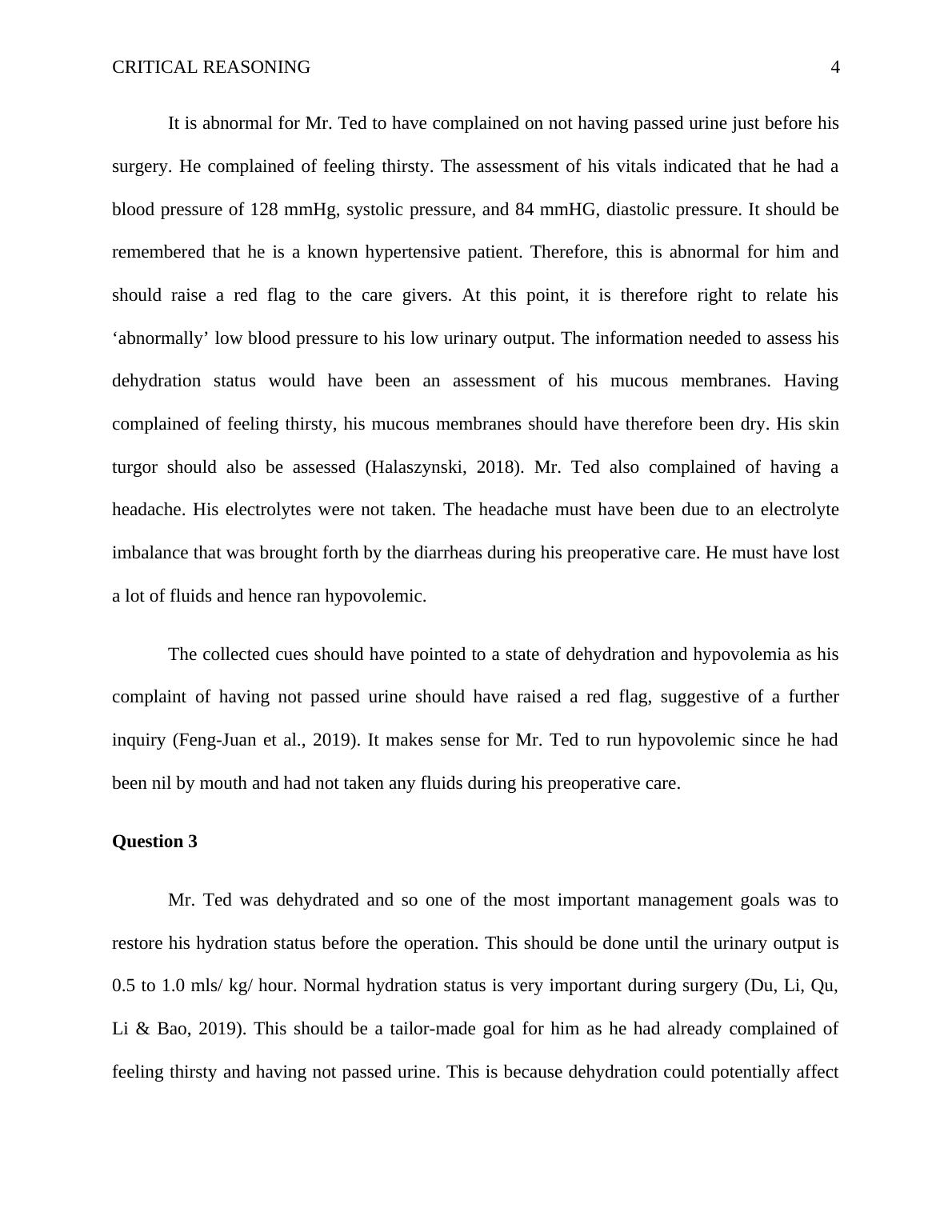Critical Reasoning in the Post-operative Management
Added on 2022-07-28
12 Pages3393 Words55 Views
Running head: CRITICAL REASONING 1
Critical Reasoning in the Post-operative Management of Mr. Ted
Your Name
College of Nursing
Capstone Course
Term and Year
Critical Reasoning in the Post-operative Management of Mr. Ted
Your Name
College of Nursing
Capstone Course
Term and Year

CRITICAL REASONING 2
Question 1
Mr. Ted is an eighty two year old male patient who lives alone and has several chronic
illnesses. It is obvious that he is affected by the bio psychosocial factors around him, which
might have implicated on his health. He lives alone in a retirement village around two and a half
hours from the city. He has two children, who abandoned him to live with their families. His
wife died some three years ago from pneumonia. Therefore, the environment around Mr. Ted
must be having an impact on his health and wellbeing. It must have therefore negatively affected
his current condition, where he has a large mass in his descending colon that extends down to the
sigmoid colon.
Mr. Ted must have been struggling with loneliness and a feeling of social isolation. It is
evident that he has chronic illnesses such as hypertension, type two diabetes mellitus and gout,
and is on medication for the same. He uses these medicines on a daily basis. Considering his old
age, Mr. Ted must be having someone to help him remember to take his drugs. The process of
senescence has been shown to be accompanied with organ function loss and cognitive decline
(He, Zeng, Huang, & Shi, 2019). Therefore, he might have forgotten to take his drugs, hence the
effect on his health. Mr. Ted must have been affected by the culture around him. His children left
him alone and so he must be stressed. The mass in his colon was detected a bit late. The
operation that is scheduled for him also has effects to him and his family.
Question 2
Mr. Ted has to undergo a bowel resection surgery in order to resolve the malignancy in
his descending colon that extends to the sigmoid colon. It should be remembered that he is a type
two diabetic patient who is also hypertensive and has gout, with an enlarged thyroid gland. His
Question 1
Mr. Ted is an eighty two year old male patient who lives alone and has several chronic
illnesses. It is obvious that he is affected by the bio psychosocial factors around him, which
might have implicated on his health. He lives alone in a retirement village around two and a half
hours from the city. He has two children, who abandoned him to live with their families. His
wife died some three years ago from pneumonia. Therefore, the environment around Mr. Ted
must be having an impact on his health and wellbeing. It must have therefore negatively affected
his current condition, where he has a large mass in his descending colon that extends down to the
sigmoid colon.
Mr. Ted must have been struggling with loneliness and a feeling of social isolation. It is
evident that he has chronic illnesses such as hypertension, type two diabetes mellitus and gout,
and is on medication for the same. He uses these medicines on a daily basis. Considering his old
age, Mr. Ted must be having someone to help him remember to take his drugs. The process of
senescence has been shown to be accompanied with organ function loss and cognitive decline
(He, Zeng, Huang, & Shi, 2019). Therefore, he might have forgotten to take his drugs, hence the
effect on his health. Mr. Ted must have been affected by the culture around him. His children left
him alone and so he must be stressed. The mass in his colon was detected a bit late. The
operation that is scheduled for him also has effects to him and his family.
Question 2
Mr. Ted has to undergo a bowel resection surgery in order to resolve the malignancy in
his descending colon that extends to the sigmoid colon. It should be remembered that he is a type
two diabetic patient who is also hypertensive and has gout, with an enlarged thyroid gland. His

CRITICAL REASONING 3
preoperative management care must therefore be appropriate and should take into consideration
any potential complications of the operation so that he can be managed accordingly (Wong
Morris Wang, & Simpson, 2018). There are several gaps in the collected cues as not all
important elements were assessed. A patient undergoing preoperative care for abdominal surgery
must have his electrolytes checked. This is because an imbalance in these electrolytes could
create more complications even affecting the cardiovascular system (Heeba et al., 2019).
The information that we as nurses need to know is the type of diet Mr. Ted frequently
uses. The type of preoperative management should also be identified being on his flexibility and
compliance. The nurses also need to know whether he has ever had such a similar operation
before and whether he had any unrelated complications (Manworren, Gordon & Montgomery,
2018). More information on his familial disease family history should be also known. His
handover report did not mention more information about his wife, Gwen, and his children. This
might have given a more meaningful insight into his current condition. For the case of Mr. Ted,
it is known that his vital signs were abit stable and within the normal range at the time of his pre-
operative management care.
Mr. Ted has several comorbidities, which will obviously have an impact on his coming
surgery. These diseases are hypertension, diabetes and gout, and they are of a lot of concern and
significance in his pre-operative and postoperative care. He uses metformin as his sugar pills.
This has to be withdrawn during and after his surgery. This is to prevent potential complications
of developing neuropathies and other kidney effects (Shoqirat, Mahasneh, Dardas, Singh &
Khresheh, 2019). However, he might have elevated blood glucose levels. It is known that he is a
hypertensive patient and so his blood pressure must be regularly checked. This is especially
important since some patients lose a lot of blood during surgery.
preoperative management care must therefore be appropriate and should take into consideration
any potential complications of the operation so that he can be managed accordingly (Wong
Morris Wang, & Simpson, 2018). There are several gaps in the collected cues as not all
important elements were assessed. A patient undergoing preoperative care for abdominal surgery
must have his electrolytes checked. This is because an imbalance in these electrolytes could
create more complications even affecting the cardiovascular system (Heeba et al., 2019).
The information that we as nurses need to know is the type of diet Mr. Ted frequently
uses. The type of preoperative management should also be identified being on his flexibility and
compliance. The nurses also need to know whether he has ever had such a similar operation
before and whether he had any unrelated complications (Manworren, Gordon & Montgomery,
2018). More information on his familial disease family history should be also known. His
handover report did not mention more information about his wife, Gwen, and his children. This
might have given a more meaningful insight into his current condition. For the case of Mr. Ted,
it is known that his vital signs were abit stable and within the normal range at the time of his pre-
operative management care.
Mr. Ted has several comorbidities, which will obviously have an impact on his coming
surgery. These diseases are hypertension, diabetes and gout, and they are of a lot of concern and
significance in his pre-operative and postoperative care. He uses metformin as his sugar pills.
This has to be withdrawn during and after his surgery. This is to prevent potential complications
of developing neuropathies and other kidney effects (Shoqirat, Mahasneh, Dardas, Singh &
Khresheh, 2019). However, he might have elevated blood glucose levels. It is known that he is a
hypertensive patient and so his blood pressure must be regularly checked. This is especially
important since some patients lose a lot of blood during surgery.

CRITICAL REASONING 4
It is abnormal for Mr. Ted to have complained on not having passed urine just before his
surgery. He complained of feeling thirsty. The assessment of his vitals indicated that he had a
blood pressure of 128 mmHg, systolic pressure, and 84 mmHG, diastolic pressure. It should be
remembered that he is a known hypertensive patient. Therefore, this is abnormal for him and
should raise a red flag to the care givers. At this point, it is therefore right to relate his
‘abnormally’ low blood pressure to his low urinary output. The information needed to assess his
dehydration status would have been an assessment of his mucous membranes. Having
complained of feeling thirsty, his mucous membranes should have therefore been dry. His skin
turgor should also be assessed (Halaszynski, 2018). Mr. Ted also complained of having a
headache. His electrolytes were not taken. The headache must have been due to an electrolyte
imbalance that was brought forth by the diarrheas during his preoperative care. He must have lost
a lot of fluids and hence ran hypovolemic.
The collected cues should have pointed to a state of dehydration and hypovolemia as his
complaint of having not passed urine should have raised a red flag, suggestive of a further
inquiry (Feng-Juan et al., 2019). It makes sense for Mr. Ted to run hypovolemic since he had
been nil by mouth and had not taken any fluids during his preoperative care.
Question 3
Mr. Ted was dehydrated and so one of the most important management goals was to
restore his hydration status before the operation. This should be done until the urinary output is
0.5 to 1.0 mls/ kg/ hour. Normal hydration status is very important during surgery (Du, Li, Qu,
Li & Bao, 2019). This should be a tailor-made goal for him as he had already complained of
feeling thirsty and having not passed urine. This is because dehydration could potentially affect
It is abnormal for Mr. Ted to have complained on not having passed urine just before his
surgery. He complained of feeling thirsty. The assessment of his vitals indicated that he had a
blood pressure of 128 mmHg, systolic pressure, and 84 mmHG, diastolic pressure. It should be
remembered that he is a known hypertensive patient. Therefore, this is abnormal for him and
should raise a red flag to the care givers. At this point, it is therefore right to relate his
‘abnormally’ low blood pressure to his low urinary output. The information needed to assess his
dehydration status would have been an assessment of his mucous membranes. Having
complained of feeling thirsty, his mucous membranes should have therefore been dry. His skin
turgor should also be assessed (Halaszynski, 2018). Mr. Ted also complained of having a
headache. His electrolytes were not taken. The headache must have been due to an electrolyte
imbalance that was brought forth by the diarrheas during his preoperative care. He must have lost
a lot of fluids and hence ran hypovolemic.
The collected cues should have pointed to a state of dehydration and hypovolemia as his
complaint of having not passed urine should have raised a red flag, suggestive of a further
inquiry (Feng-Juan et al., 2019). It makes sense for Mr. Ted to run hypovolemic since he had
been nil by mouth and had not taken any fluids during his preoperative care.
Question 3
Mr. Ted was dehydrated and so one of the most important management goals was to
restore his hydration status before the operation. This should be done until the urinary output is
0.5 to 1.0 mls/ kg/ hour. Normal hydration status is very important during surgery (Du, Li, Qu,
Li & Bao, 2019). This should be a tailor-made goal for him as he had already complained of
feeling thirsty and having not passed urine. This is because dehydration could potentially affect

End of preview
Want to access all the pages? Upload your documents or become a member.
Related Documents
Principles Of Nursing And Ethicslg...
|11
|2943
|25
Nsrg258: Principles of Nursing Surgical | Q&Alg...
|11
|3524
|36
Chronic illnesses such as hypertensionlg...
|11
|2915
|30
Perioperative Nursing Care Experiencelg...
|12
|2972
|12
NRSG258 Principles of Nursing: Mr. Ted’s Case | Assignmentlg...
|11
|2919
|28
Critical Analysis Case Study 2022lg...
|11
|2912
|31
